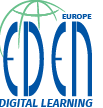
- This event has passed.
Lisbon
February 26, 2011 @ 00:00
Valuing learning cultures a step towards shrinking the digital divide
Among the primary factors influencing the development and implementation of e-learning, those that look beyond just the aspects of technology and management are fast gaining importance. Information and knowledge moves in cyberspace through very different learning environments. Exploratory learning has recently developed into a widely-used term. More and more educational activities are supported on the Internet and interaction can largely be managed virtually. The understanding of cultural features in communication processes and their impact on e-learning, together with the most effective positioning and interpretation of intercultural issues pose today highly relevant questions.
Introducing and embedding learning into every human activity is high on the agenda. A holistic approach in distance and e-learning requires a deep understanding: the ability to compare, understand and integrate. Understanding the relevance of the cultural dimension’ requires intense efforts, if we are to go beyond its abstract meaning, beyond slogans.
The year 2008 will be the year of intercultural dialogue, offering the opportunity to put the issue of learning cultures and their impact as the focus of the EDEN Annual Conference. Intercultural issues are becoming even more relevant in the light of emerging policy initiatives like the Riga Declaration; the proposed 2008 e-inclusion initiative, and i2010 that link culture and learning within the context of e-government, active citizenship and social cohesion. Learning to be a good citizen and learning to be a good European require a new orientation for e-learning, that can help to bring together different cultural backgrounds.
We are witnessing the emergence and manifestation of different digital learning patrimonies, which have in the recent period become key terms and have been instrumental in understanding the contemporary e-learning phenomenon. The extension of this understanding is highly relevant to the closely linked cultural patrimonies.
Cultural understanding, efficiency and quality go hand in hand
Bridging professional cultures is not only important for the development of human understanding but also from the e-learning perspective for adopting and facilitating the integration of tools and solutions and developing synergies. There is a challenging variability in the cultural adaptation of ICTs. A well-understood intercultural approach is instrumental in re-structuring the educational enterprise and exploring new development scenarios. The effectiveness of technology may be reduced or improved by factors such as the values and learning styles of users. The emotional and motivation aspects for learning also emerge as highly relevant.
Open thinking and building on well integrated cultural diversity can also promote help in creating a reflective learning space. Cultural understanding in learning also means gaining knowledge from other training cultures and learning design solutions, which have developed in different professional sectors or geographical regions, where the settings necessitate the application of different approaches. Importantly, cultural understanding also supports diversity, releasing aspirations for achievement, the desire for self-sufficiency and independence essential factors of 21st century knowledge and competence development.
Learning culture how does it work in the ‘2.0’ environment?
Learning is becoming an increasingly personalised experience. We can learn practically everywhere and it is more and more the student who finds the ways to learning. The social web has also largely extended the scope of collaboration in learning. The new generation technology solutions and Web 2.0 tools are necessarily cultural matters. Cultural understanding may help to raise and exploit fully the new e-learning concepts based on social web.
Collaboration and partnerships in distance and e-learning reduce fragmentation, promote integration and cohesion, improving not only the pooling of knowledge but also engagement. The intercultural approach helps to understand and better support the much quoted inclusion and access aspects of ICTs and learning. On the other hand, if we use intercultural learning as an operational concept, for understanding and exploiting different learning styles and learning methods, this may well help both to increase learning efficiency and to implement new learning systems.
Cultural aspects certainly make part of the social change and inclusion scenario in e-learning, raising the ‘solidarity’; ‘individuality’ and ‘communality’ questions. Broadening of the idea of the ‘civilised society’ can also evidently be promoted through learning. The increased mobility of both individuals and groups, but also within communities and nations, has stressed the great importance of learning to cope and to understand cultural diversity. People are communicating more than ever, but being as physically apart from each other as never before. This phenomenon is changing the very nature of our way of learning, working and living.
